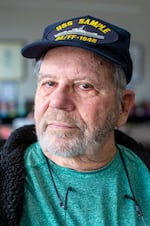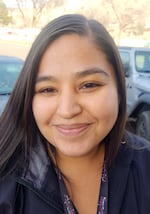Editor’s note: As President Donald Trump takes office, OPB is providing a look over the week surrounding inauguration to understand how Oregonians voted, how they’re feeling now and how the new administration could affect Northwest communities through top issues like immigration, tariffs, criminal justice and the I-5 bridge replacement.

People across Oregon and Washington share their hopes, fears and viewpoints, as a second Trump administration is about to begin, in January, 2025.
Illustration by Kristyna Wentz-Graff / OPB
Some people in the Northwest are welcoming President Donald Trump’s second inauguration with an open mind, like Jordan Mitchell from Warm Springs, Oregon.
“I used to be on the train before where I really disliked him. But I’m not on that no more. I actually don’t mind this guy anymore so, we’ll see,” the 21-year-old said while sitting in the cab of his truck outside the Warm Springs Indian Reservation’s general store.

Jordan Mitchell, 21, on the Warm Springs Reservation in Oregon, Jan. 12, 2025, says his views on Trump have positively shifted since the president's first term: "I feel like a lot of the most negative stuff was put out more than the good things he actually did do," Mitchell says.
William Robbins / OPB
Making her way into the store on the same frigid January morning, Coleta Macy carried heavier feelings about the president’s second tenure, and his hardline immigration rhetoric.
“I have a lot of friends, and friends that have become family, who don’t have papers and are paying taxes and doing what they need to do to become citizens. A lot of their families are in danger,” said the 37-year-old from Warm Springs.
“The next four years are going to be a crazy ride, but I’ll do my best to move forward and to continue to use my voice,” she added.
Voters in Oregon and Washington overwhelmingly voted against Trump in November, though the president still received notable support in each state. In some cases, people who view the president as holding some extreme political stances still voted for him due to his positions on the economy or immigration. That’s left some Northwest residents with mixed feelings as the president takes the oath of office Monday.
In downtown Redmond, Oregon, Joe Anderson said he was inclined to back Trump – albeit hesitantly.
“I think Trump’s personal morals are horrible and I hate it that we have someone leading our nation like that. I think he has some good economic ideas, but that’s as far as it goes,” Anderson said.
His choice caused friction in his own family, especially among grandkids, he said. But for others walking along the same Central Oregon main street, the choice was more black and white.
“I’m most excited for the change,” Kim McClure of Culver said. “Trump says, ‘I’m going to do all these things,’ and I believe he’s going to do it.”
She was out running errands at the same time as Katie from Bend, who didn’t want to give her last name. Both of them, despite voting differently in the election, used similar language to express radically different expectations for the president’s next term.
“All of it feels very overwhelming and important,” Katie said. “I think the biggest thing for me is taking care of our people, taking care of us, and us taking care of each other.”
McClure also hoped for less political disagreement locally, but saw the president as being in line with that: “I believe that he is for America and he really wants to do a good job for us.”
The women disagreed when asked about Trump’s proposed policies, including his promise to “launch the largest deportation program in American history.”
“That’ll be great,” McClure said. “People have been coming in and they’re not necessarily the kind of people we wanted to be here. Hopefully, he’ll be very fair about that.”
Katie, though, viewed the administration’s immigration policy proposals as inherently “unfair.”
“We’ve made it so difficult [for people to immigrate legally], so that I get why people come over illegally,” she said. “Not to mention just the workforce that’s being eliminated and how much money it would cost to deport all these people. Who’s going to pay for that?”
Immigration was among one of the most pressing issues that OPB reporters heard about when fanning out across Oregon and Southwest Washington to ask people about their hopes and fears leading up to Inauguration Day.
In Vancouver, Washington, 68-year-old David Silver worried that the president’s vow to “seal the border” will ruin his life.
“My partner lives in the Middle East and is Muslim, and we know now that he will not be able to come to the United States,” he said.
Soccoro Hernandez, 54, was out walking her dog in downtown Vancouver around the time Silver was, and she felt his pain: “A lot of different groups are in danger,” she said.
Besides immigration, many of Trump’s critics zeroed in on the president’s stances toward climate change, deploying tariffs and supporting states’ rights to criminalize reproductive health care like abortion.

Juniper Yi, 20, on her way to work in downtown Redmond, Oregon, Jan. 11, 2025. Yi disagrees with much of the President's policy statements. She was still in high school during Trump's first term, and now she believes the political outlook has worsened: "I hate it," she says, "This is not what America stands for."
Kathryn Styer Martínez / OPB
“He’s going to continue to do climate violence, and violence on anybody that’s not white in this country,” Andrew Wardenaar from Milwaukie,Oregon, said.
In Warm Springs, Harly David, 21, said the president “makes me scared as a woman being in my own country…and how that’s going to affect my health in the future.”
Juniper Yi of Redmond said she’s “most concerned about the tariffs that Trump was talking about and how that would influence the cost of buying things.”
She’s worried about Trump’s position on China potentially raising prices, including his plans to downgrade the country’s trading status with the U.S.
Among some of the president’s backers, like Redmond’s Anderson, there was consensus that many of these fears are being overblown.
“I think sometimes Trump says things that he knows are not true because he’s jockeying for a negotiating position,” Anderson said.
But other supporters hope Trump follows through on his stump speeches, like Wayne, also from Redmond, who said he voted for the president and didn’t want to give his last name.
“[Trump] needs to have a way to do it so that it’s going to perpetuate,” he said. “So that the next administration can’t come in and change it back.”
At the Redmond Senior Center, entitlements like Social Security and Medicare benefits were most top of mind for people with views across the political spectrum. The president said many times on the campaign trail that he would not cut those programs, or raise the retirement age.

Wayne, 81, at the Redmond Senior Center, Jan. 9, 2025, says he's his excitement for President Trump's return is largely about "getting control of the borders and maybe helping with price stabilization."
Kathryn Styer Martínez / OPB
“That I like,” Chip Horsley, 65, said. He was in his gym clothes, catching a few games of pickleball as others played bingo or perused paperbacks in the senior center library.
“One thing I’ve learned,” Horsley said: “If you want to keep friends, you don’t talk politics.”
But even among the Northwest’s most seasoned and politically diverse residents, the topic is hard to avoid. He said he’s lost some relationships over his own views on Trump.
“I’m not excited about him at all,” he said, “Like I tell my friends, I said I hope he proves me wrong.”
In the senior center library, Mark, 75, from Powell Butte, Oregon, was enthusiastic about Trump taking office. He declined to give his last name.
“I’m thrilled because we need some changes in this country. If we don’t get changes and things straightened out, we’re going to have more problems down the road,” he said.
Mark agreed with many of the changes Trump has promised, including one frequent campaign talking point to “sign a new executive order to cut federal funding for any school pushing critical race theory, transgender insanity, and other inappropriate racial, sexual or political content.”
When Susan heard that statement from Trump, she felt a familiar sense of hopelessness mixed with anger.
“I’m trans myself and maybe one day somebody’s going to knock on my door and haul me off,” said the 79-year-old, who declined to give her last name.
At this point, she added, she wouldn’t mind if she could pick a new country, “where I’m as respected as anyone else.” She pondered Tasmania as one option, “if they welcomed me.”

Alexandria Inguiano, 35, on the Warm Springs Reservation in Oregon, Jan. 12, 2025, says the threat of deportations weighs on her: "All of the Trump supporters are making a big deal about him being in the office, and all the changes that people are already predicting, it just doesn't sound too good at all," she says.
William Robbins / OPB
Other education-related claims from Trump also hit home for her, like the president’s repeated promise to defund any schools that require vaccines.
“I got polio. My left leg recovered, but my right leg didn’t,” she said, noting she was born before the polio vaccine and has had a lifelong limp. “I don’t love a country that is so blind to facts like that.”
Susan has a hard time empathizing with Trump supporters anymore, even though on this day she was playing bingo with a few of them.
“I keep my mouth shut,” she said, “I don’t think they believe what is happening. The country is afraid and we’re going to get what we deserve.”
William Robbins contributed reporting from the Warm Springs Indian Reservation; Kathryn Styer Martínez contributed reporting from Redmond, Oregon; Erik Neumann contributed reporting from Vancouver, Washington; and Joni Land contributed reporting from Portland, Oregon.
To see all of OPB’s ongoing coverage of regional politics and the latest national updates, visit our Politics page.
